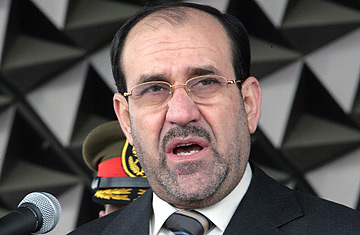
Iraqi Prime Minister Nuri Al-Maliki speaks during celebrations for Iraqi Army Day on January 6, 2007 at the Tomb of the Unknown Soldier in Baghdad.
(2 of 2)
"This government is not suitable for Iraq any more," says Salleh al-Muttlag, an Iraqi parliament member. "It should end as soon as possible." The leader of a Sunni opposition bloc, Muttlag has never been high on Maliki. But his call for Maliki's resignation, one of many now rising in the wake of Saddam Hussein's execution , goes beyond demands for new leadership in the prime minister's office. Muttlag says the entire U.S.-backed political structure in Iraq, parliament included, should be torn down and rebuilt. "Reconciliation will never happen under the Maliki government or a similar government," says Muttlag. "We're now looking for another solution." Such feelings are becoming more widespread in Iraq as the country waits for the White House to announce its new strategy. An increase in U.S. troops appears imminent, but many view even a successful military push to secure Baghdad and other areas of Iraq as only half a solution at best.
During the prime minister's short time in office, the state institutions the Bush administration worked so assiduously to build with Iraqis have broken down almost entirely. The Iraqi Army, a force the U.S. hoped would hold Iraq together as the country's nascent civilian government developed, is years away from the ability to do so. Whether the army is making progress toward that end, or splintering into sectarian factions, is unclear to many U.S. soldiers tasked with training Iraqi forces on most days now. Certain units think nothing of simply ignoring deployment orders issued by the prime minister.
Meanwhile, some civilian Iraqi government agencies such as the Ministry of Interior have become franchises of the Mahdi Army militia. And Iraq's parliament was essentially dissolved in November, when Sadr's loyalists began a boycott at his behest in protest of Maliki's meeting with President Bush. As the White House crafts its new approach to Iraq, little of the government appears salvageable even in the eyes of leaders like Muttlag who are staking their careers, and sometimes their lives, on the eventual success of a civilian government. With so little material left to work with in Baghdad, many in Iraq are looking to Washingto n for a bold political stroke that would sweep the sitting government from power as more U.S. troops roll in.
